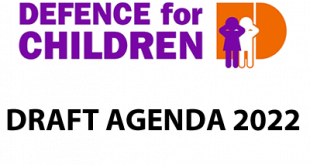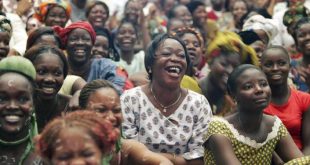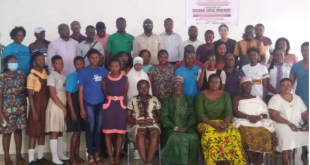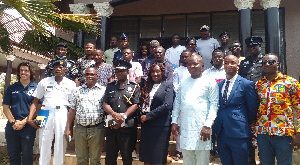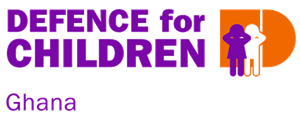INT’L GIRL CHILD DAY: Ensure that all teaching ,training fields are ‘digitally compliant’-gov’t told
As part of activities of celebrating this year’s International day of the Girl child, Defence for Children International(DCI-Ghana) in collaboration with Rights and Responsibilities Initiatives Ghana (RRIG) and Erudite Women Empowerment Foundation (EWEF),have observed that Girls need digital competence for peak performance. The group said “as much as we appreciate the efforts of digitalizing the economy to date in respect of remittances to families from Abroad, facilitating communication, used of virtual education and improvement in social media handlings, We call on Government, all relevant stakeholders to make Digitalization a priority and plan adequately to respond to the Gender selective plans and budget to ensure that, teaching and training at all fields are digital-compliance as well as affording all especially teachers to be computer literate to translate effective and enhanced knowledge to the children.
Again, we call on National cyber security parameters need to intensify their operations at all levels since in the wake of COVID 19, many children are at risk of undermined their basic rights due to the exposure to social exploitation and use of violence. They are also disadvantaged in access to digital and virtual education and training as well as case reporting mechanisms”. The appeal was contained in a statement issued on Monday 21th October,2021 and jointly signed by Aba Oppong and Christopher Dapaah,She Leads Alliance – Ashanti Region. The statement said there is therefore collective responsibility to ensure safe digital environment. We also need to educate our children to adopt smart techniques on safety protocol online including but not limited to giving out personal information like house address, phone numbers, avoid meeting people in the middle of the nights and not accepting files, as well as all friendly request and messages .
“Children should be guided against money scams especially Mobile money scammers as well as anonymous calls for contacting someone for winning a raffle must receive in caution”
Read the Full statement;
DEFENCE FOR CHILREN INTERNATIONAL (DCI-GHANA) IN COLLABORATION WITH RIGHTS AND RESPONSIBILITIES INITIATIVES GHANA (RRIG) AND ERUDITE WOMEN EMPOWERMENT FOUNDATION (EWEF)
SHELEADSALLIANCE-ASHANTIREGION
PRESS RELEASE
CELEBRATION OF THE 2021 INTERNATIONAL DAY OF THE GIRL IN ASHANTI REGION
THEME:‘DIGITAL GENERATION, OUR GENERATION’
She Leads is an initiative of Plan International Netherlands (PIN), Defence for Children – ECPAT the Netherlands (DCI-ECPAT), African Women’s Development and Communication Network (FEMNET), and Terre des Hommes the Netherlands (TdH). It is situated at the intersection of child rights, gender equality and civic space. Our consortium unites child rights organisations, feminist/women’s rights organisations, and GYW-led groups. The main objective of the project is to increase sustained influence of girls and young women (GYW) on decision-making and the transformation of gender norms in formal and informal institutions. The consortium envisages achieving this objective by working through three interrelated domains:
Social and Cultural Domain: Support by increased acceptance of positive social gender norms
Civil Society Domain: Enhancement of collective action of girls and young women in a gender-responsive civil society.
Institutional Domain: Enabling meaningful participation of girls and young women in decision-making by political institutions.
In Ghana, the project is being implemented by 4 partners: Defence for Children International (DCI) Ghana, Plan International Ghana, Gender Centre for Empowering Development (GenCed) and Women’s Aspire Network’s (WAN) in the following regions;
Ashanti
Central
Greater Accra
Northern
Upper East
Upper West
In the Ashanti Region, the project is being implemented in the following Metropolitan, Municipal and District Assemblies (MMDAs): Asante Akim North,Asokore Mampong, BosomeFreho, Bosomtwe, Kumasi and Obuasi by DCI Ghana, Rights and Responsibilities Initiatives Ghana (RRIG) and Erudite Women’s Empowerment Foundation (EWEF).
The International Day of the Girl is a day that global community celebrates the rights of the girl to education and highlighting the need to eliminate all forms of discrimination against girls. Girls and young women face multiple challenges purely because of their age and gender. Today, many girls from being denied an education to being forced in child marriage, with a lot of evidence that girls face a myriad of obstacles that prevent them from realizing their full potentials. It is in context that the “She Leads Project”is implemented to raise awareness of the obstacles that girls face in this digital generation and to celebrate and reinforce achievements on the11 October 2021.
ThisPlatform provides the opportunity to celebrate girls’ peoples’ views and initiatives on a global digital scale. Today, young people hold a crucial role working towards the implementation of the Sustainable Development Goals and related frameworks. The international community has born witness to young people’s unprecedented mobilization around the world, which has shown the massive power they possess to hold decision-makers accountable in the digital environment. In 2021, the Generation Equality Forum launched five-year commitments for bolder solutions to gender inequality – just as the world entered the second year of the COVID-19 pandemic.
While the pandemic has accelerated digital platforms for learning, earning and connecting, some 2.2 billion people below the age of 25 still do not have internet access at home and Ghanaian childis in the worst situation. It is realized thatthe gender gap for global internet users grew from 11 per cent in 2013 to 17 per cent in 2019. In the world’s least developed countries including Ghana, it hovers around 43 per cent. As of 2019, just over half of the world’s population is online, with a large digital divide observed among regions. For instance, while 85% of the population was using the Internet in Europe and Northern America, only 20% were connected in LDCs. While fixed-broadband subscriptions continue to increase, growth in subscriptions has slowed to 2.7% in 2020.
In developed countries, there were more than 33 subscriptions per 100 inhabitants, representing a high penetration rate, whereas in developing countries this number stood at 11.5 per 100 inhabitants. In LDCs, fixed networks are almost completely absent, with only 1.3 subscriptions per 100 inhabitants. It is noticed also that, about 2.2 billion people below the age of 25 do not have internet access at home with girls more likely to be cut off in Ghanaian communities. Furthermore, in Global context, the percentage of females among science technology engineering and mathematics (STEM), the graduation rate is below 15% in over two thirds of the countries.Within the middle- and higher-income countries, it is seen that, only 14% of GIRLS who were top performers in science or mathematics expected to work in science and engineering compared to 26% of the top performing boys.
By 2021 UNICEF reports, only 22% of artificial intelligence (AI) professionals globally are women, a massive gender gap in who is currently at the heart of designing the algorithms that will impact our lives. But the gender digital divide is about more than connectivity. Girls are also less likely than boys to use and own devices and gain access to tech-related skills and jobs. Only by addressing the inequity and exclusion that span geographies and generations can we usher in a digital revolution for all, and with all. It is clear by all measurements that, progress for adolescent girls has not kept pace with the realities they face today, and COVID-19 has reinforced many of these gaps.
As COVID-19 tears through communities across the globe, children and more especially girls have become the hidden victims of the pandemic.School closures and other lockdown measures adopted to stem the spread of the virus have cut off millions of children from quality learning, critical vaccines, and nutritious diets. The struggles to make life in this digital age for girls, also come at the cost of their safety. The risk of gender-based violence and harmful practices soars during an emergency – especially for girls living under restricted movement and socioeconomic decline. Many girls kept from school today had not and will never return, and therefore their childhood stolen by child marriage or teenage pregnancy. By closing the digital gaps especially for the Ghanaian rural girl child of this generation needs the much more digital education than before to catch up with recent generation in helping to solving the mentioned and many more challenges.
In the instance of celebrating the International Day of the Girl Child on the 11th October 2021, it is intended to educate, create awareness on issues of concern, to mobilize political will and resources to address digital problems. This celebrationis reinforcing achievements of humanity as the digital relevance of girl child to know their digital realities and the solutions they need to excel on their diverse pathways so that this generation of girls can become a generation of technologists. This Digital celebration will showcase through advocacy messages to let the stakeholders understand the enhanced digital literacy as a driver of economic growth, a competitive business and national advantage as well as a weapon for fighting human rights especially for Girls rights and empowerment in today’s Generation and for the future.
As much as we appreciate the efforts of digitalizing the economy to date in respect of remittances to families from Abroad, facilitating communication, used of virtual education and improvement in social media handlings,We call on Government, all relevant stakeholders to make Digitalization a priority and plan adequately to respond to the Gender selective plans and budget to ensure that, teaching and training at all fields are digital-compliance as well as affording all especially teachers to be computer literate to translate effective and enhanced knowledge to the children.Again, we call on National cyber security parameters need to intensify their operations at all levels since in the wake of COVID 19, many children are at risk of undermined their basic rights due to the exposure to social exploitation and use of violence. They are also disadvantaged in access to digital and virtual education and training as well as case reporting mechanisms.
There is therefore collective responsibility to ensure safe digital environment. We also need to educate our children to adopt smart techniques on safety protocol online including but not limited to giving out personal information like house address, phone numbers, avoid meeting people in the middle of the nights and not accepting files,as well as all friendly request and messages . Children should be guided against money scams especially Mobile money scammers as well as anonymous calls for contacting someone for winning a raffle must receive in caution.
Furthermore, Government,Parents and Guardians should have opened conservation with children on the internet to keep them safe.
With all these, it is the res
ponsibility of Government and all Ghanaians to safeguard our children despite the numerous opportunities that the digitalized world offers globally and let the benefits of digital world on skills and entrepreneurship development, provision of affordable broad band, girls and women rights online become of relevance today and the for the future generation within the context of leaving no one behind.
For us at She Leads Ghana Network in Ashanti Region, we call on all stakeholders responsible for the effective development of girls to provide girls in their quest to be knowledgeable in the digital community, appropriate ICT resources to enable them fit into the digital world. The resources they will need include time, space, funds, phones, computers, and trainers to become digital savvy as every aspect of life has become digital. Girls need digital competence for peak performance wherever they find themselves. To be assertive they need to communicate through advocacy, campaigns, and self-definition. To excel in school, they need to have the capacity to access supporting theory and best practices in their chosen field of work and interest. At home they need it to improve their wellbeing and that of their depends, family and friends.Prepared by Aba Oppong and Christopher DapaahShe Leads Alliance – Ashanti Region


Source: New Trust in Kumasi
